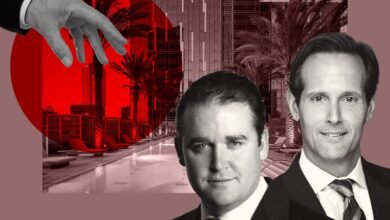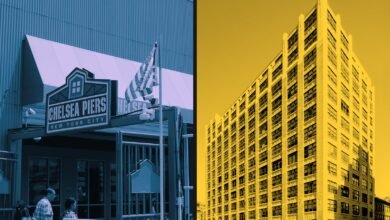Why Developer Michael Fallon Loves NYC But Builds in Southeast
Two decades ago, the Fallon Company developed a 20-unit condominium on Sackett Street in Brooklyn. Since then the Boston-based builder has finished more than $5 billion worth of projects, but not a single one in New York City.
It’s not because CEO Michael Fallon, whose father Joseph Fallon founded the company in 1993, has anything against New York City.
“New York is such a fabulous place,” he said, describing it as the social, cultural and business mecca of the United States. “It’s such a deep pool of opportunity.”
Yet Fallon sees greener pastures for his firm in the Southeast, in particular Nashville and Charlotte, as well as his home market of Boston.
“Why are we focused on the markets we’re focused on? Scale and access to capital,” the 36-year-old said in a Zoom interview with The Real Deal.
Fallon likes building in Nashville and Charlotte because of their good infrastructure, financial health, amenable stakeholders, business-friendly political climates and nice weather. Also, both have a National Football League franchise.
Most of Fallon’s $6 billion pipeline is in the Southeast. There, he doesn’t have to worry that locals will elect political leaders eager to “decommoditize” housing — a concept that popped up as Fallon researched Zohran Mamdani in preparation for his TRD interview.
In one campaign video, Mamdani says, “If we want to end the housing crisis, the solution has to be moving toward the full de-commodification of housing.”
To the contrary, the only feasible strategy to end — or prevent — a housing crisis is to allow for-profit development at scale.
Fallon does that by building affordable units the traditional way, typically with Low Income Housing Tax Credits, partnerships with big insurers such as Mass Mutual and Prudential, and debt from major lenders including Fortress Investment Group; Santander, Bank OZK, Wells Fargo and Key Bank.
The first phase of his next Nashville project will be 100 percent affordable and have north of 300 units. In the second phase, 10 percent of the units will be income-restricted. The $3 billion project, of which Fallon is the master developer, is expected to break ground next year.
Fallon is also working with Charlotte’s housing authority on a mixed-use project with 975 residential units, 405,000 square feet of office, 36,000 square feet of retail and amenities, and a 180-key hotel. Phase one includes 329 units, 20 percent of which will be affordable.
To be sure, the Fallon Company’s last New York project was long before the socialist Mamdani came along. It has steered clear because like most developers, it prefers to operate in markets where it knows the players and the regulatory, cultural and political environment.
“It’s about de-risking that whole spectrum of development as much as you can,” the CEO said. “In New York, it’s very complex and challenging to build.”
His company has been in Charlotte since 2016, Raleigh since 2018 and Nashville since 2019.
“Nashville in particular is very focused on ‘how do we make this a compelling investment opportunity for a company relocation?’” Fallon said. “You need the city to remove friction points, and that is what the city and state are really good at.”
Tennessee’s capital city is pursuing smart growth and striving to be competitive with other Southeast markets in attracting development, the CEO said.
New York has become more hospitable to new housing since the city’s vacancy rate was found to have sunk to a record low of 1.4 percent in 2023, but it still requires high wages and substantial affordability in large multifamily projects. The hotel workers union has effectively blocked nonunion hotels. Rezoning remains a crapshoot, and historic districts and local opposition are major obstacles.
Doing a big project in New York would mean navigating these pitfalls and competing with firms familiar with the ins and outs of the city; Fallon cited the Related Companies’ Hudson Yards and Tishman Speyer’s the Spiral as among his favorite developments. He would also have to find investors to bet on that proposition.
“We need to focus on markets where we have a competitive edge in product, in relationships, in policy,” Fallon said. “That works for partners with very long-term capital.”
Read more

Who’s the boss? East Bank megadevelopment draws lawmaker scrutiny

Fallon Co taps mixed-use pro to lead East Bank development

Fallon Co nears affordable development start in Charlotte’s South End




